Abstract
Optimal medical management of phenylketonuria (PKU) requires the use of special low-phenylalanine foods for many years. For women with PKU, elevated maternal blood levels of phenylalanine even at conception can lead to fetal damage. Despite this need, private health insurance, Medicaid, and other public health programs often exclude the cost of these foods from their benefits. The New York State Department of Health conducted a survey of metabolic disorders treatment centers to elucidate the problems PKU patients have obtaining and paying for the special foods essential to their care. Payment for special foods was denied to nearly half of those with private health insurance policies and was covered for only 10 percent of Medicaid-eligibles. A public program for children with special health care needs covered these food costs in upstate New York but not in New York City. There is no program of assistance for adults who are not eligible for Medicaid and who do not have private insurance coverage of special foods. At present, many private health insurance policies and public programs do not cover the costs of low-phenylalanine foods other than infant formula. Payment for this essential part of the management of PKU should be mandated for all public programs for persons with chronic illnesses, public medical assistance (Medicaid) programs, and private health insurance. There is a need for a public program to assist adults with PKU who are not eligible for Medicaid and who do not have health insurance that covers these costs.
Full text
PDF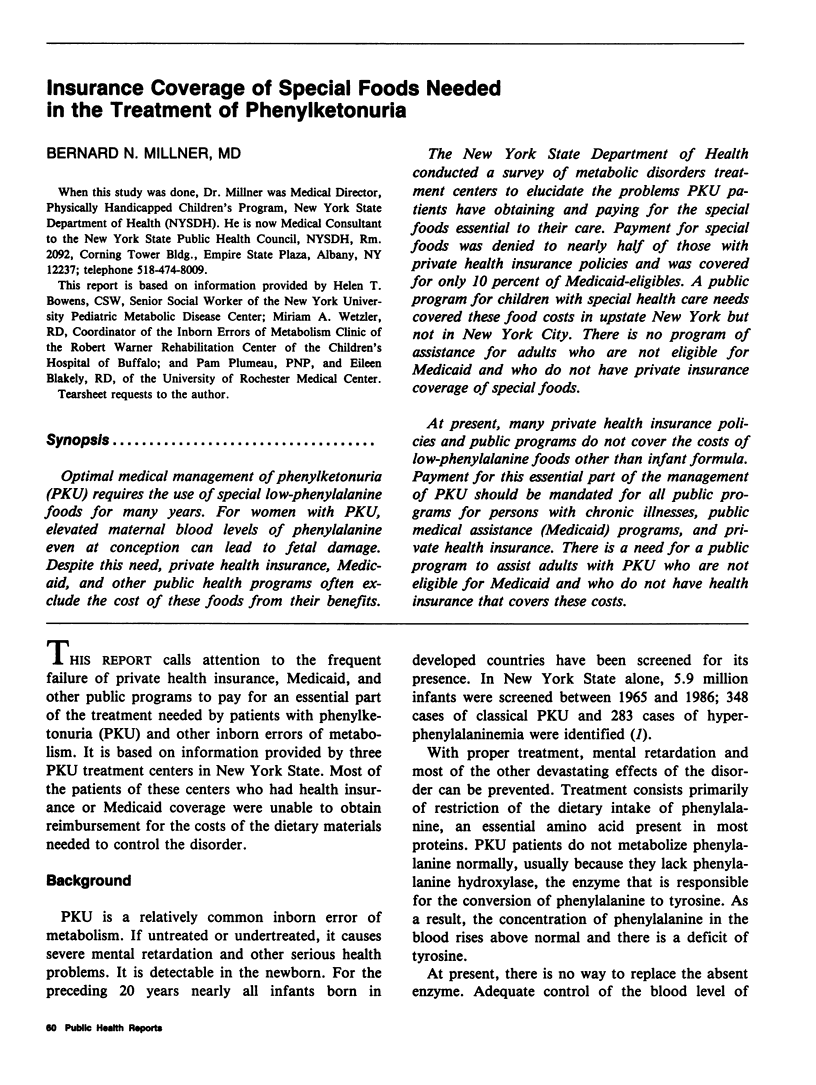
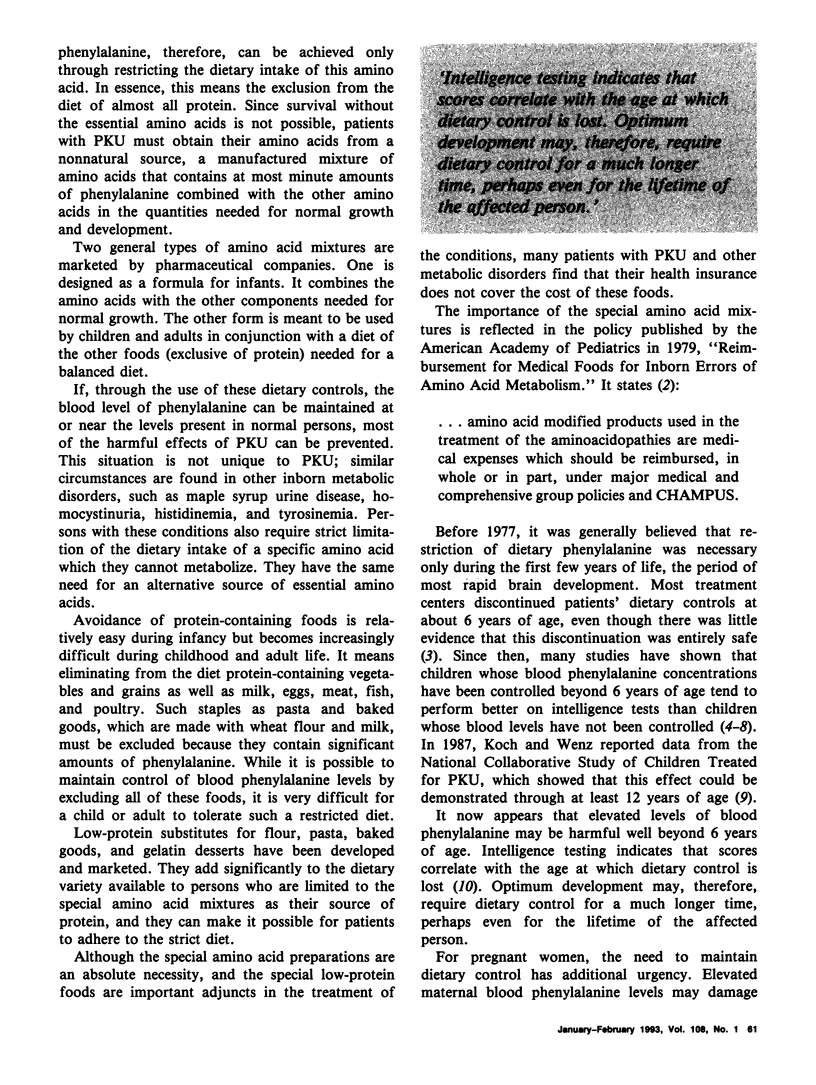
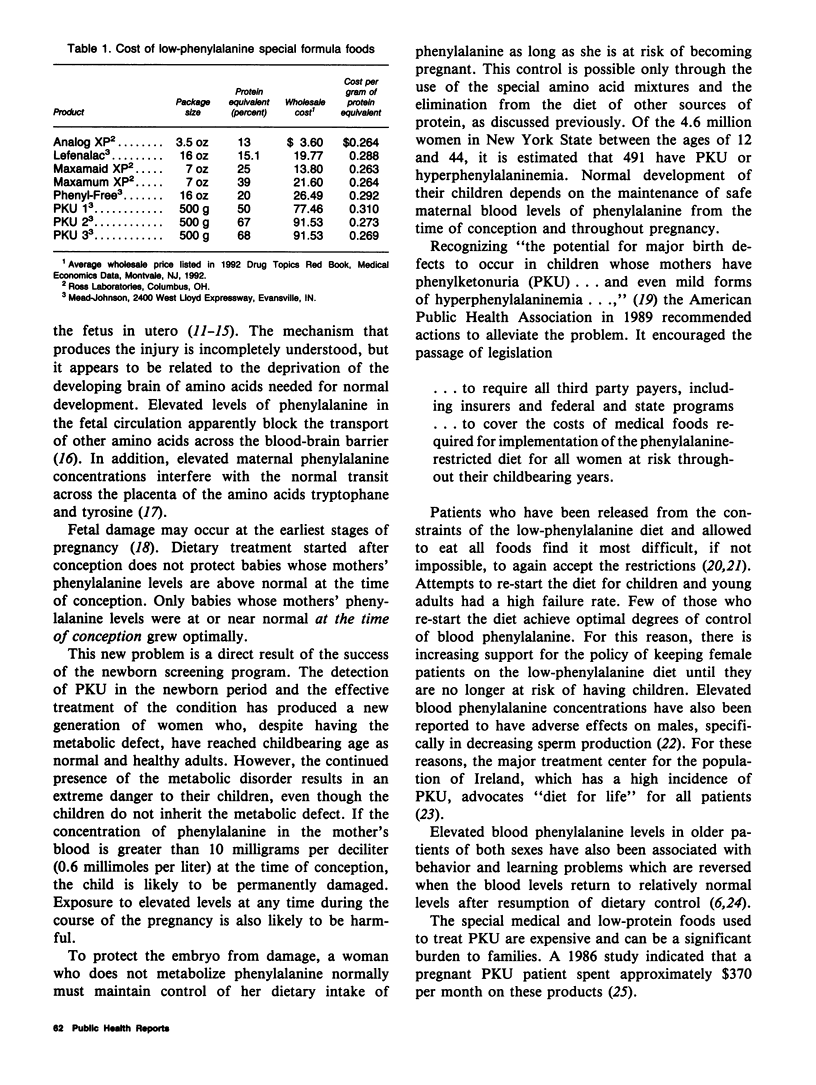
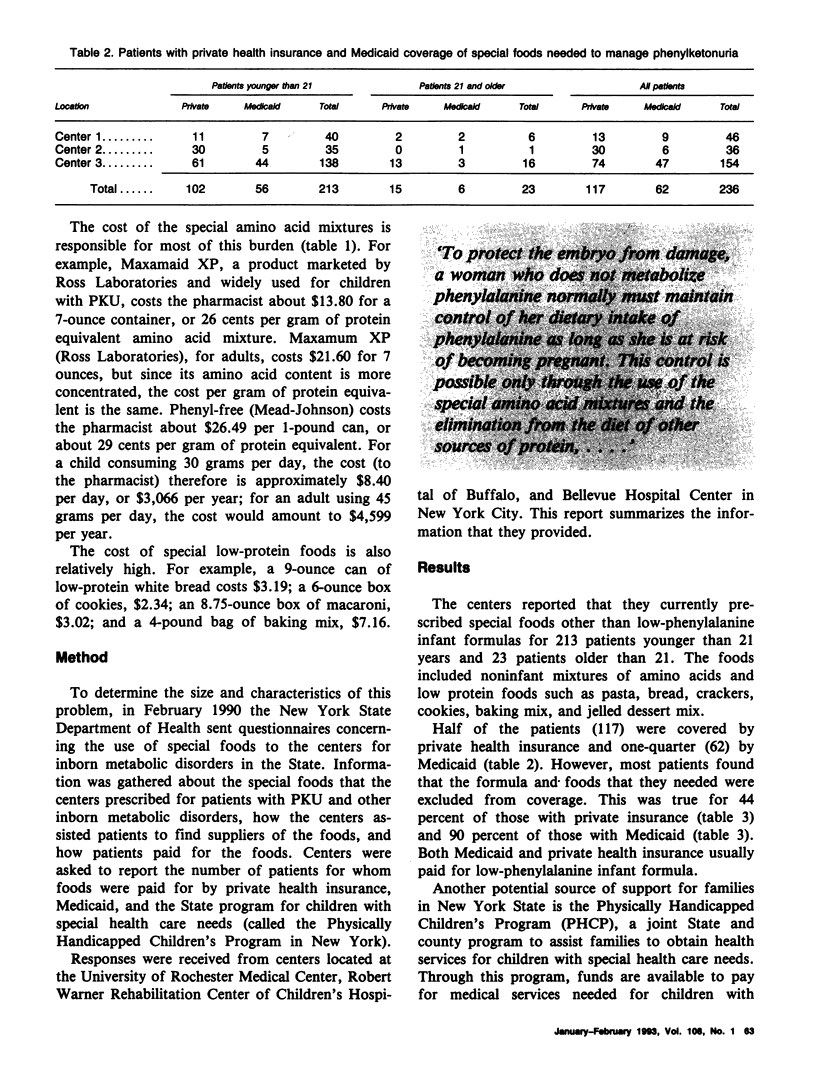
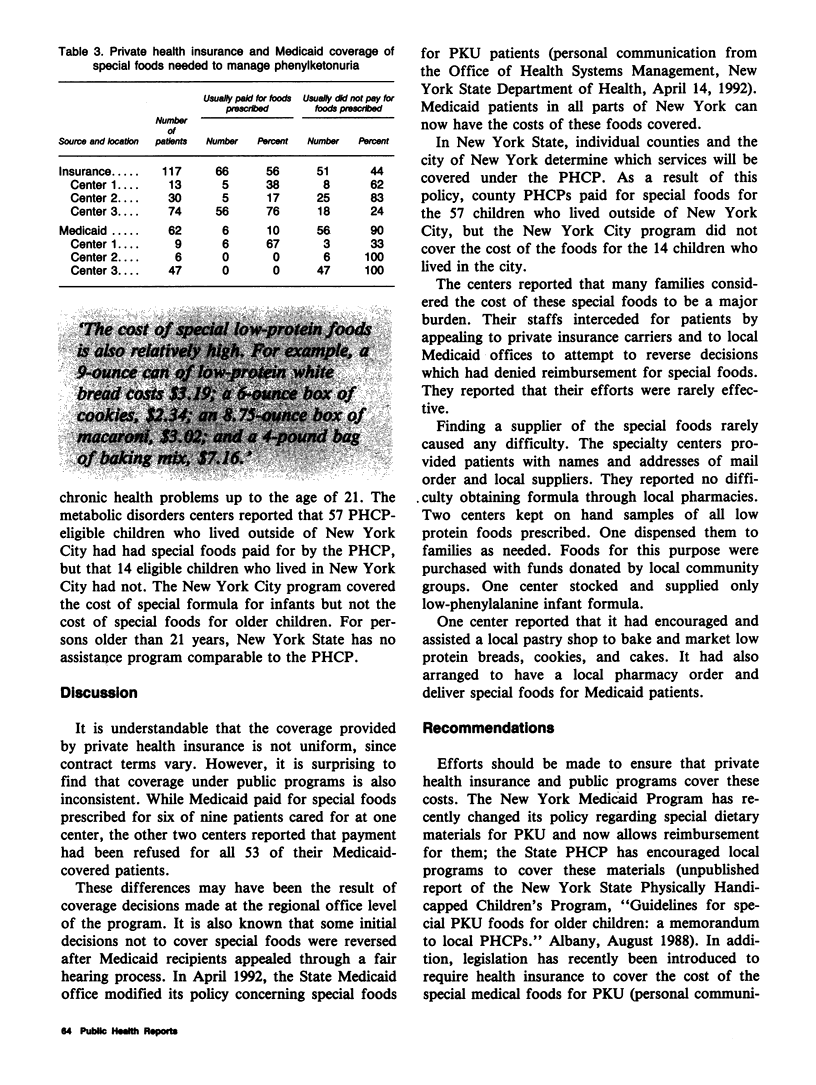
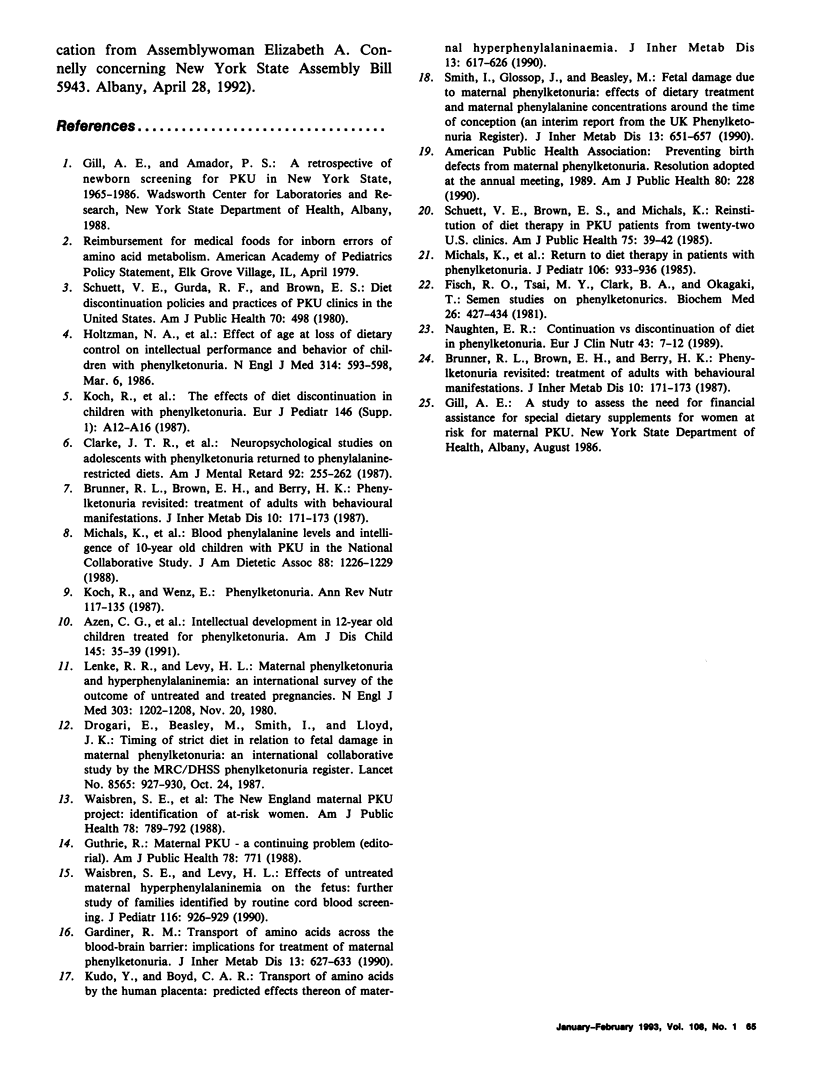
Selected References
These references are in PubMed. This may not be the complete list of references from this article.
- Azen C. G., Koch R., Friedman E. G., Berlow S., Coldwell J., Krause W., Matalon R., McCabe E., O'Flynn M., Peterson R. Intellectual development in 12-year-old children treated for phenylketonuria. Am J Dis Child. 1991 Jan;145(1):35–39. doi: 10.1001/archpedi.1991.02160010037012. [DOI] [PubMed] [Google Scholar]
- Brunner R. L., Brown E. H., Berry H. K. Phenylketonuria revisited: treatment of adults with behavioural manifestations. J Inherit Metab Dis. 1987;10(2):171–173. doi: 10.1007/BF01800044. [DOI] [PubMed] [Google Scholar]
- Brunner R. L., Brown E. H., Berry H. K. Phenylketonuria revisited: treatment of adults with behavioural manifestations. J Inherit Metab Dis. 1987;10(2):171–173. doi: 10.1007/BF01800044. [DOI] [PubMed] [Google Scholar]
- Clarke J. T., Gates R. D., Hogan S. E., Barrett M., MacDonald G. W. Neuropsychological studies on adolescents with phenylketonuria returned to phenylalanine-restricted diets. Am J Ment Retard. 1987 Nov;92(3):255–262. [PubMed] [Google Scholar]
- Fisch R. O., Tsai M. Y., Clark B. A., Okagaki T. Semen studies on phenylketonurics. Biochem Med. 1981 Dec;26(3):427–434. doi: 10.1016/0006-2944(81)90017-x. [DOI] [PubMed] [Google Scholar]
- Gardiner R. M. Transport of amino acids across the blood-brain barrier: implications for treatment of maternal phenylketonuria. J Inherit Metab Dis. 1990;13(4):627–633. doi: 10.1007/BF01799517. [DOI] [PubMed] [Google Scholar]
- Guthrie R. Maternal PKU--a continuing problem. Am J Public Health. 1988 Jul;78(7):771–771. doi: 10.2105/ajph.78.7.771. [DOI] [PMC free article] [PubMed] [Google Scholar]
- Holtzman N. A., Kronmal R. A., van Doorninck W., Azen C., Koch R. Effect of age at loss of dietary control on intellectual performance and behavior of children with phenylketonuria. N Engl J Med. 1986 Mar 6;314(10):593–598. doi: 10.1056/NEJM198603063141001. [DOI] [PubMed] [Google Scholar]
- Koch R., Azen C. G., Hurst N., Friedman E. G., Fishler K. The effects of diet discontinuation in children with phenylketonuria. Eur J Pediatr. 1987;146 (Suppl 1):A12–A16. doi: 10.1007/BF00442049. [DOI] [PubMed] [Google Scholar]
- Kudo Y., Boyd C. A. Transport of amino acids by the human placenta: predicted effects thereon of maternal hyperphenylalaninaemia. J Inherit Metab Dis. 1990;13(4):617–626. doi: 10.1007/BF01799516. [DOI] [PubMed] [Google Scholar]
- Lenke R. R., Levy H. L. Maternal phenylketonuria and hyperphenylalaninemia. An international survey of the outcome of untreated and treated pregnancies. N Engl J Med. 1980 Nov 20;303(21):1202–1208. doi: 10.1056/NEJM198011203032104. [DOI] [PubMed] [Google Scholar]
- Michals K., Azen C., Acosta P., Koch R., Matalon R. Blood phenylalanine levels and intelligence of 10-year-old children with PKU in the National Collaborative Study. J Am Diet Assoc. 1988 Oct;88(10):1226–1229. [PubMed] [Google Scholar]
- Michals K., Dominik M., Schuett V., Brown E., Matalon R. Return to diet therapy in patients with phenylketonuria. J Pediatr. 1985 Jun;106(6):933–936. doi: 10.1016/s0022-3476(85)80242-0. [DOI] [PubMed] [Google Scholar]
- Naughten E. R. Continuation vs discontinuation of diet in phenylketonuria. Eur J Clin Nutr. 1989;43 (Suppl 1):7–12. [PubMed] [Google Scholar]
- Schuett V. E., Brown E. S., Michals K. Reinstitution of diet therapy in PKU patients from twenty-two US clinics. Am J Public Health. 1985 Jan;75(1):39–42. doi: 10.2105/ajph.75.1.39. [DOI] [PMC free article] [PubMed] [Google Scholar]
- Schuett V. E., Gurda R. F., Brown E. S. Diet discontinuation policies and practices of PKU clinics in the United States. Am J Public Health. 1980 May;70(5):498–503. doi: 10.2105/ajph.70.5.498. [DOI] [PMC free article] [PubMed] [Google Scholar]
- Smith I., Glossop J., Beasley M. Fetal damage due to maternal phenylketonuria: effects of dietary treatment and maternal phenylalanine concentrations around the time of conception (an interim report from the UK Phenylketonuria Register). J Inherit Metab Dis. 1990;13(4):651–657. doi: 10.1007/BF01799520. [DOI] [PubMed] [Google Scholar]
- Waisbren S. E., Doherty L. B., Bailey I. V., Rohr F. J., Levy H. L. The New England Maternal PKU Project: identification of at-risk women. Am J Public Health. 1988 Jul;78(7):789–792. doi: 10.2105/ajph.78.7.789. [DOI] [PMC free article] [PubMed] [Google Scholar]
- Waisbren S. E., Levy H. L. Effects of untreated maternal hyperphenylalaninemia on the fetus: further study of families identified by routine cord blood screening. J Pediatr. 1990 Jun;116(6):926–929. doi: 10.1016/s0022-3476(05)80654-7. [DOI] [PubMed] [Google Scholar]


